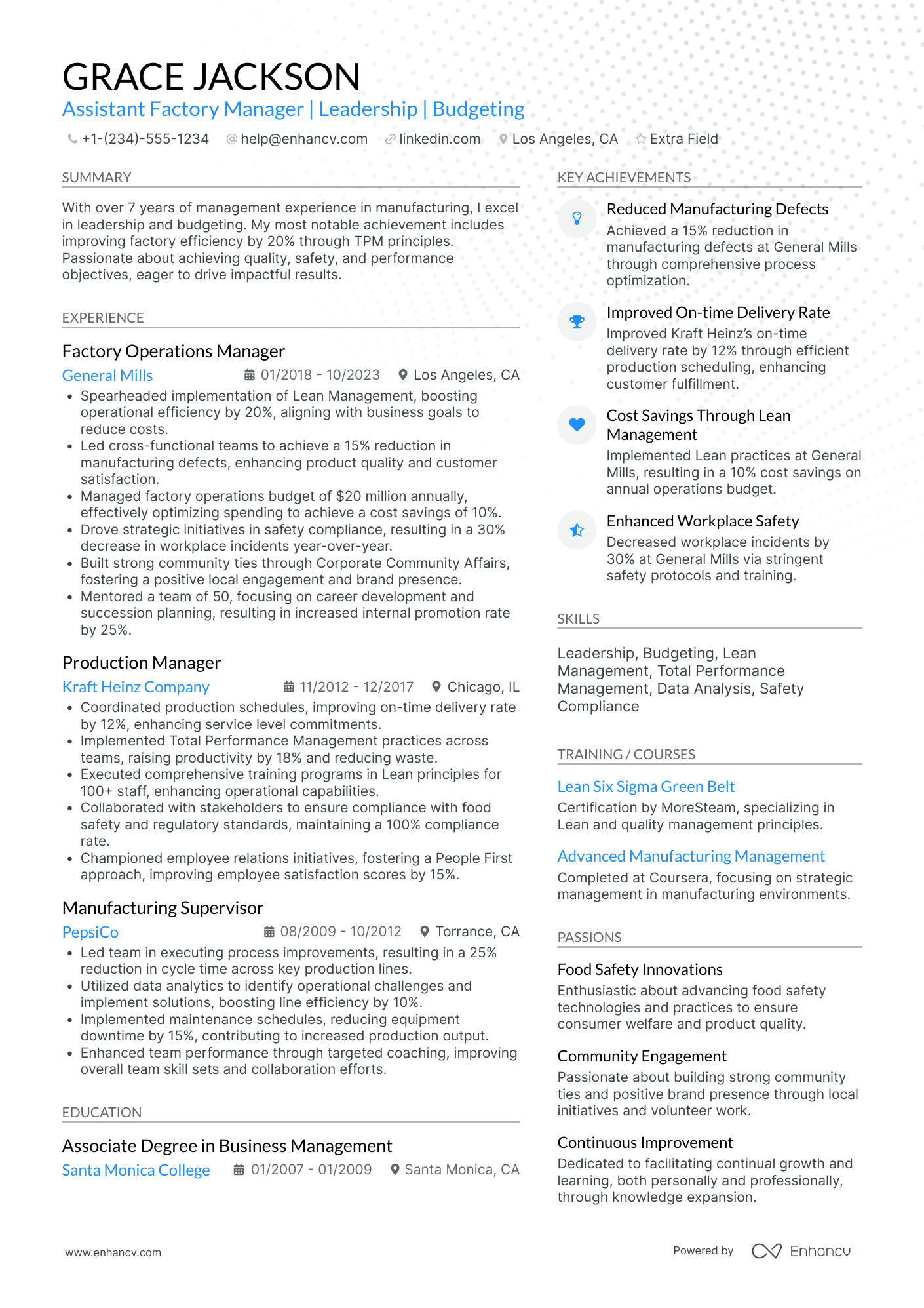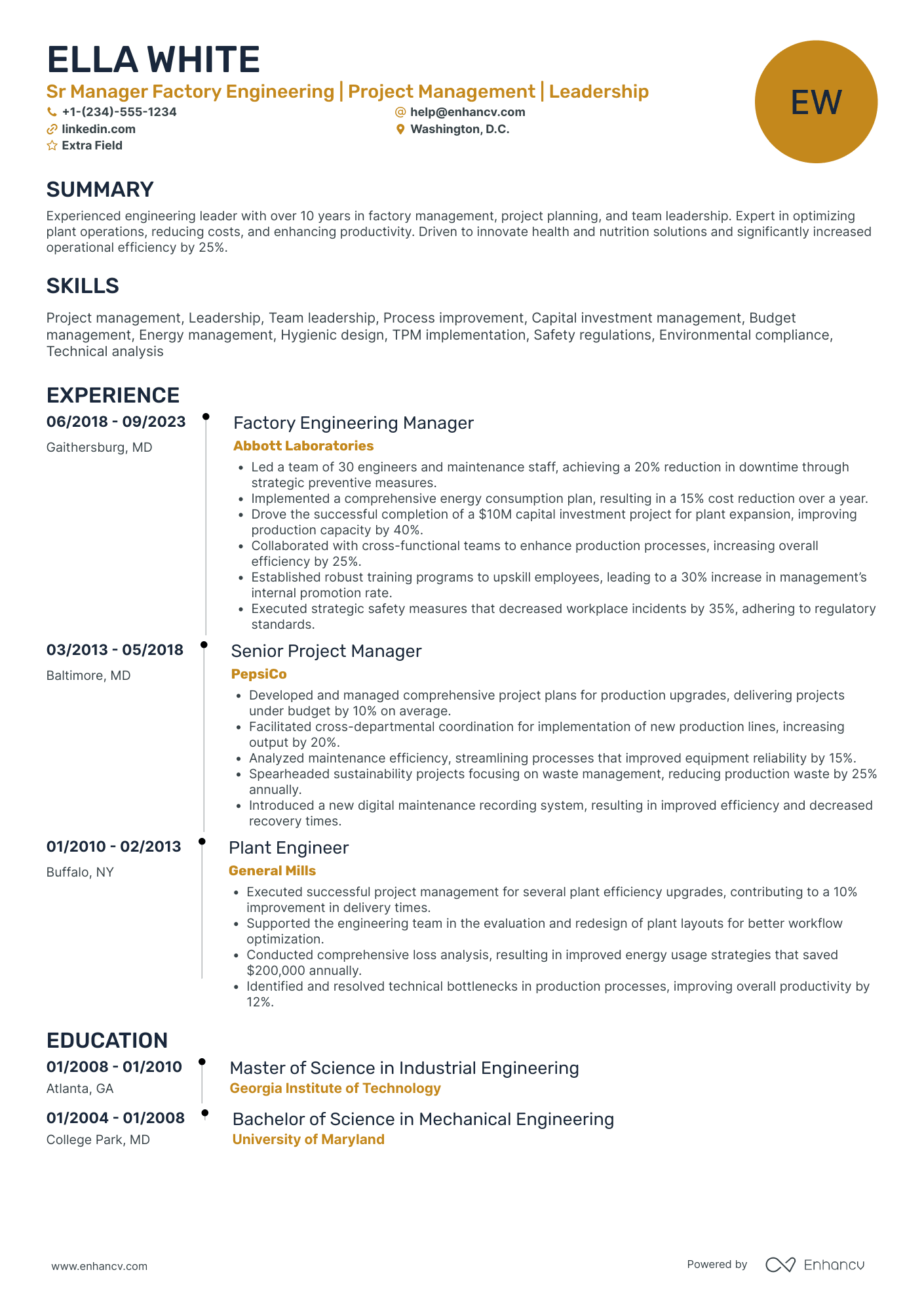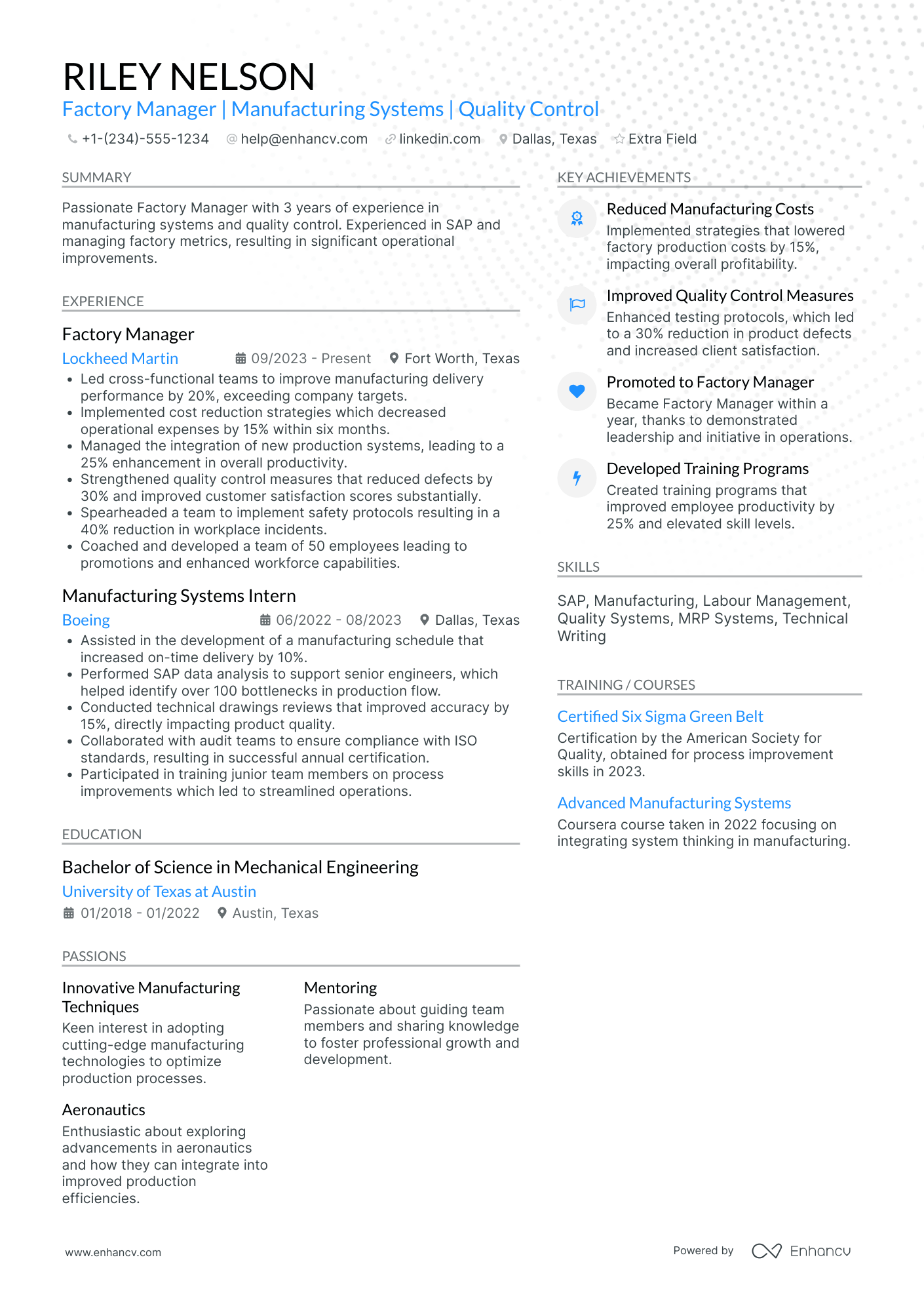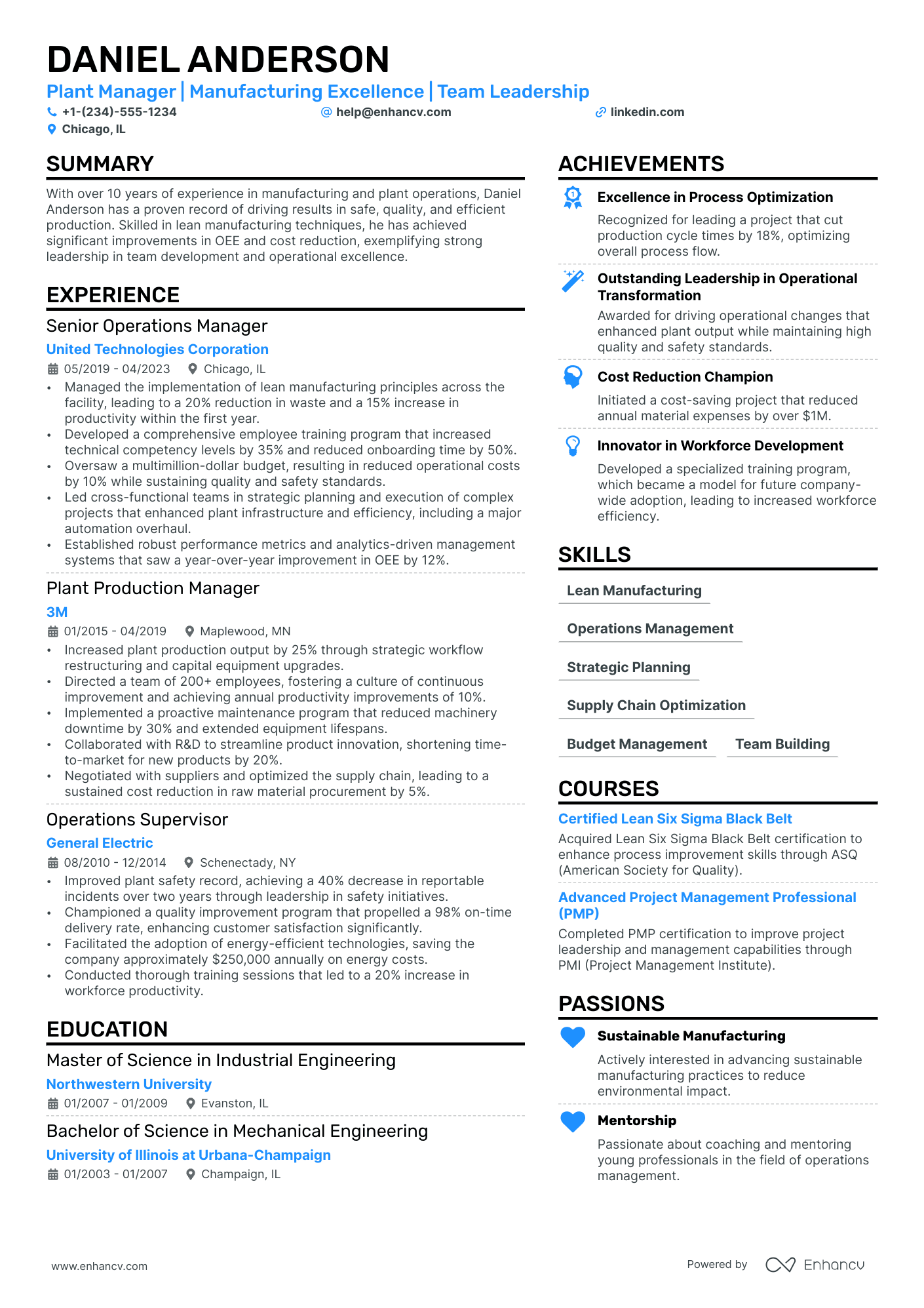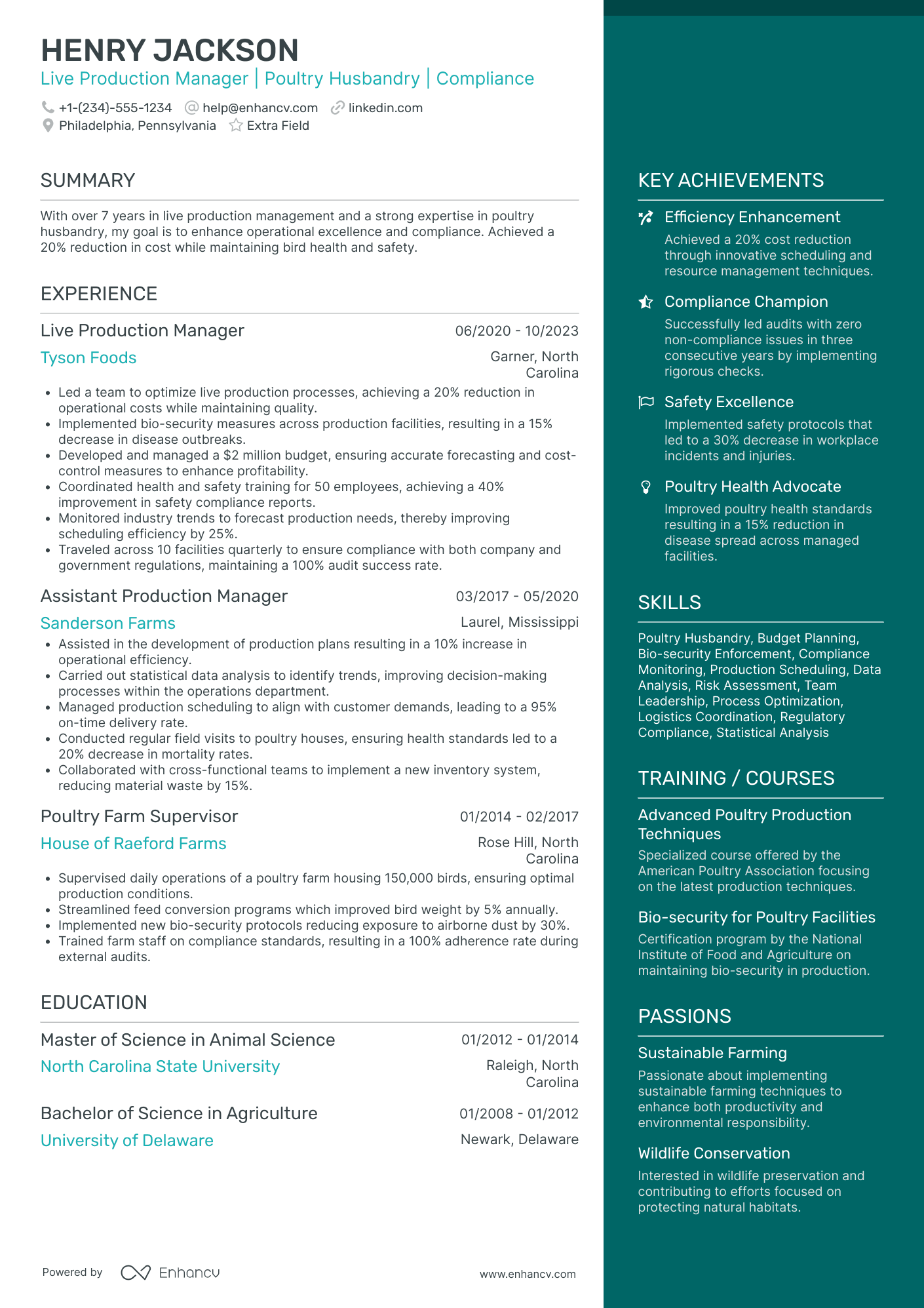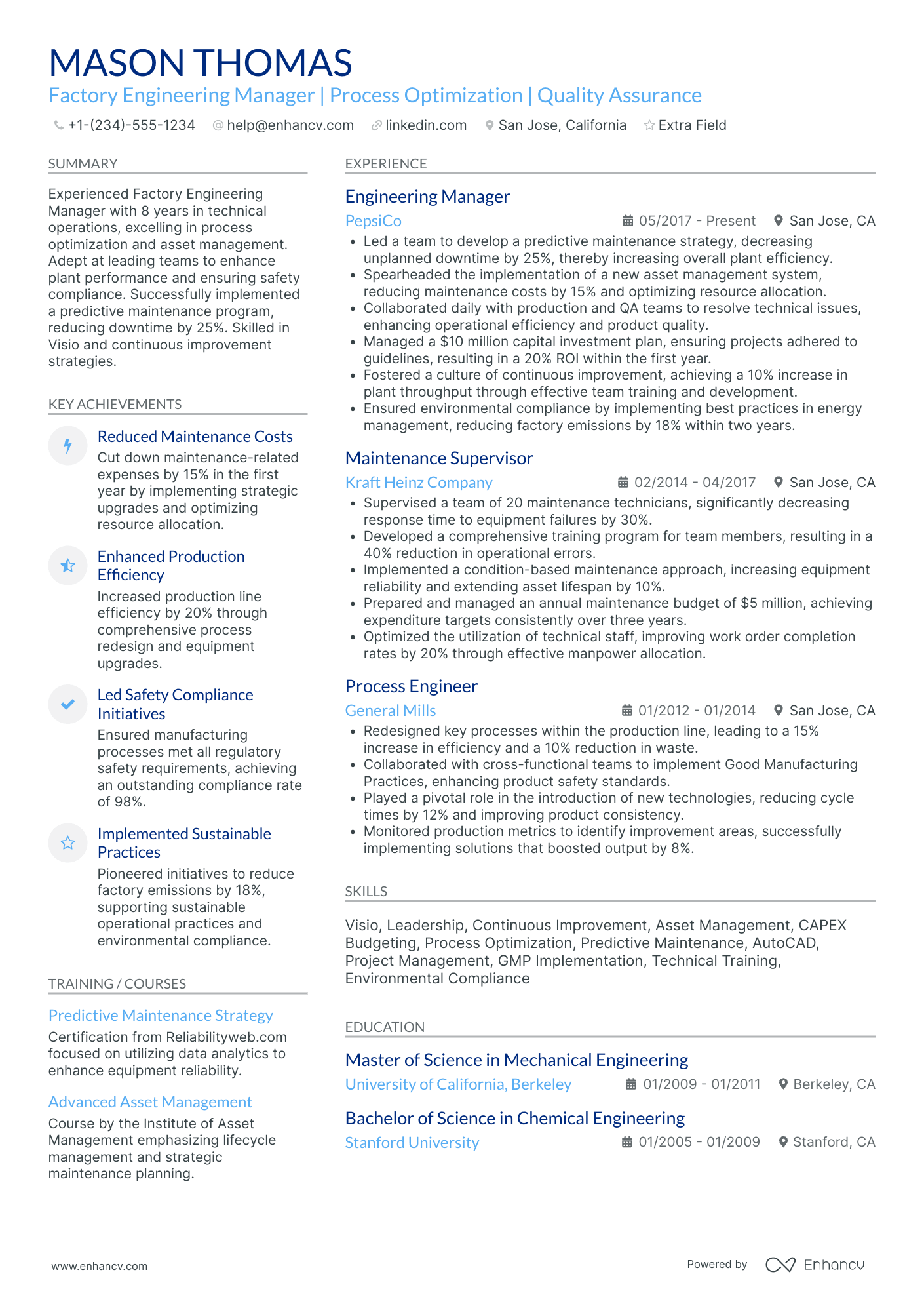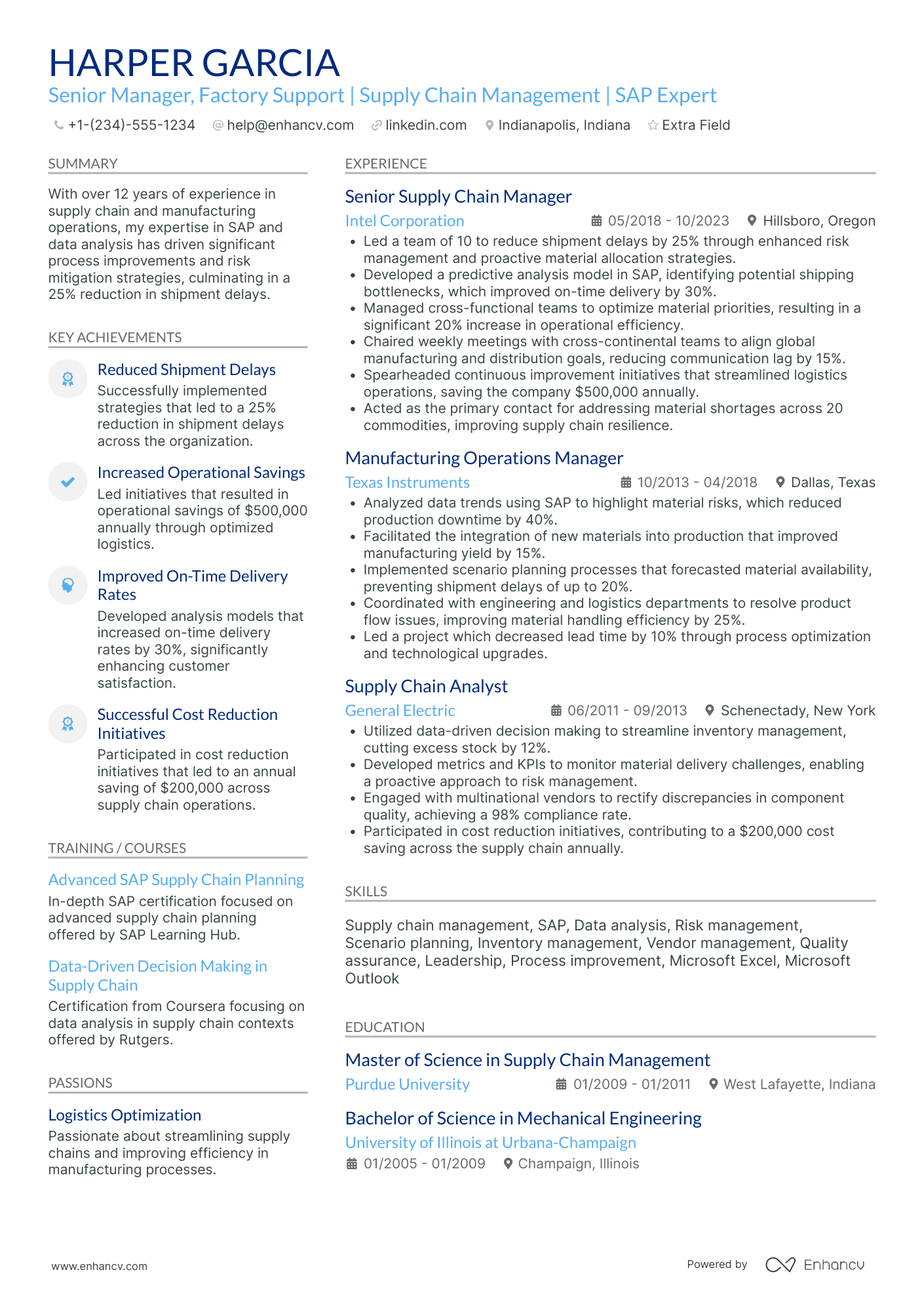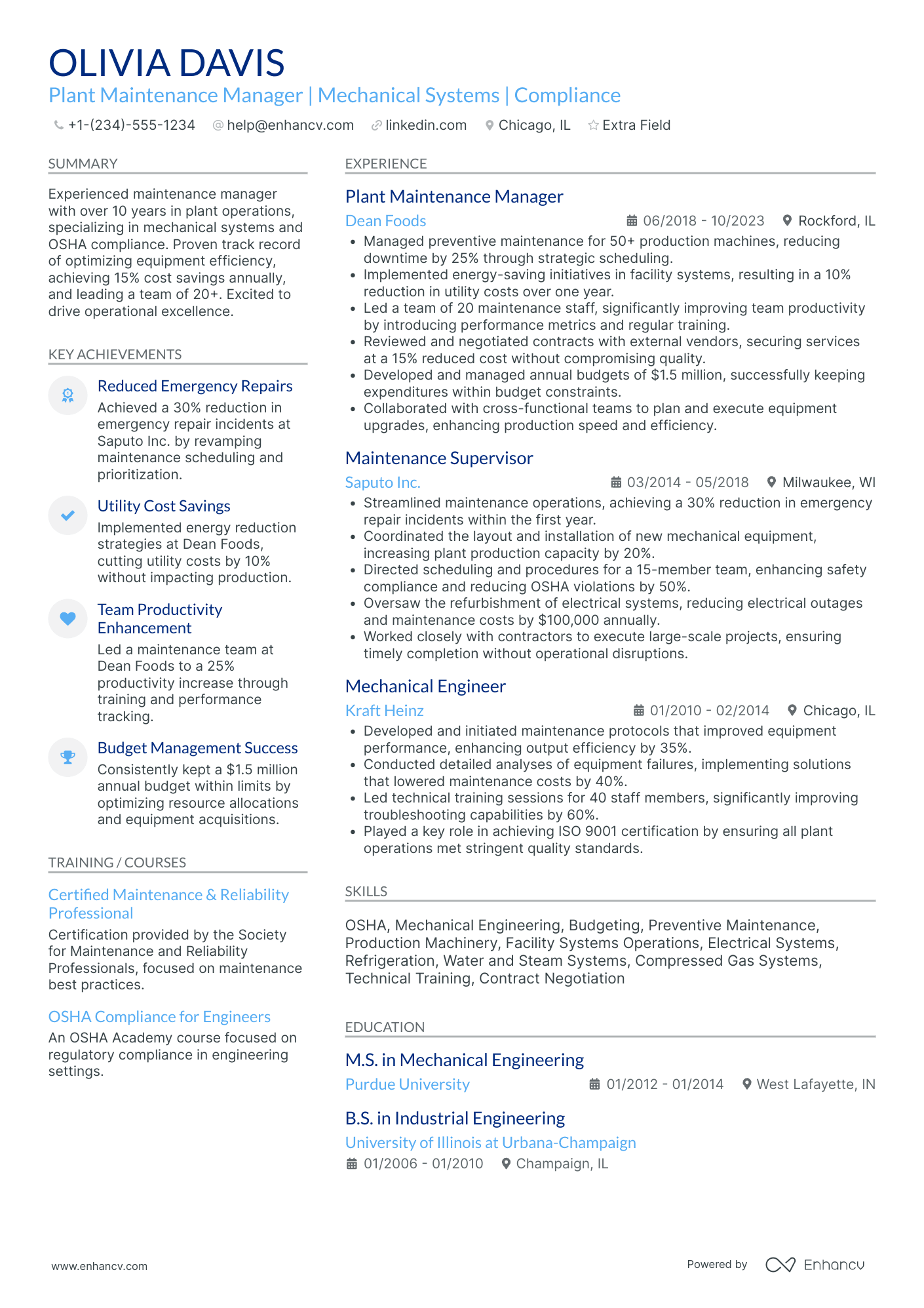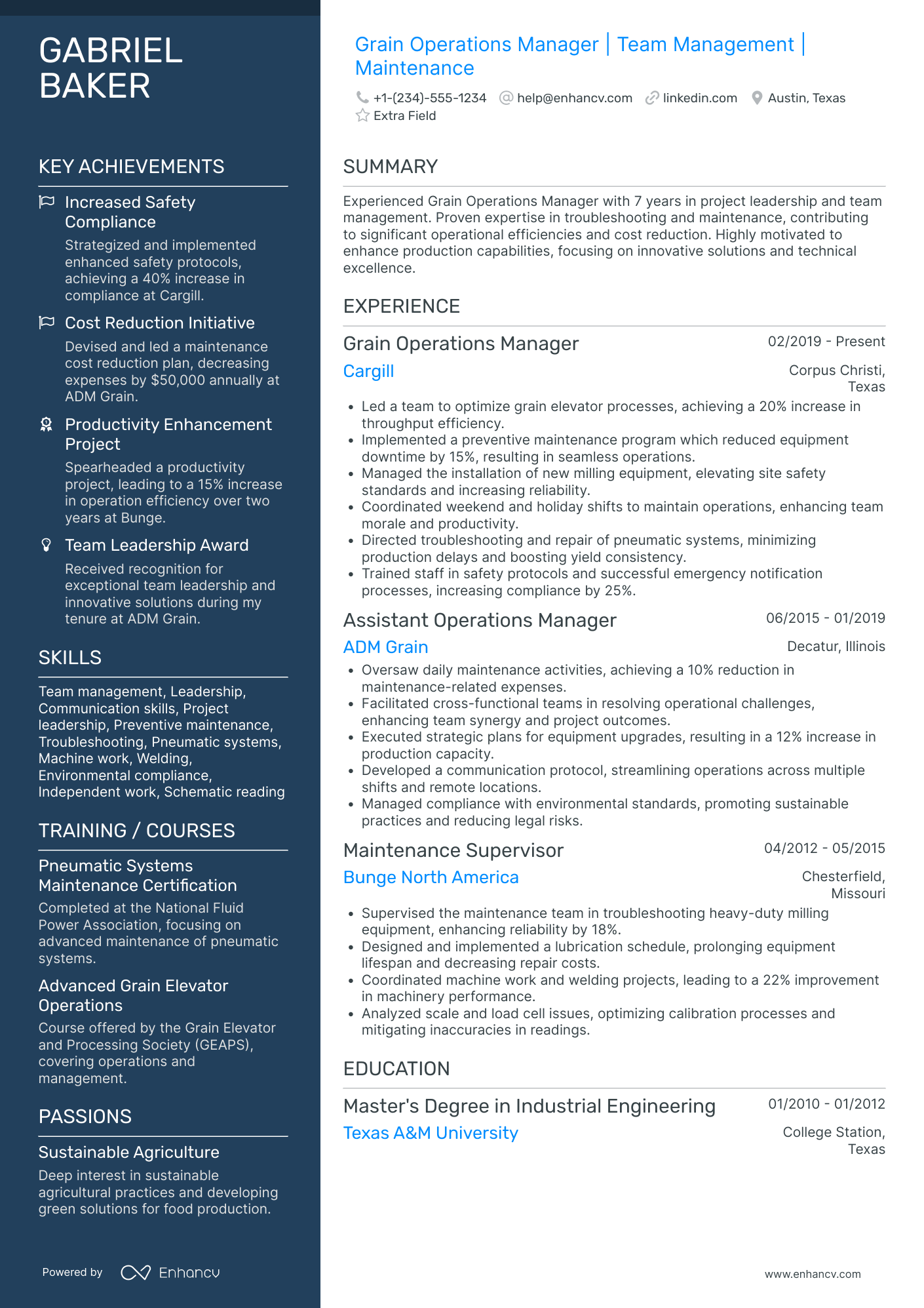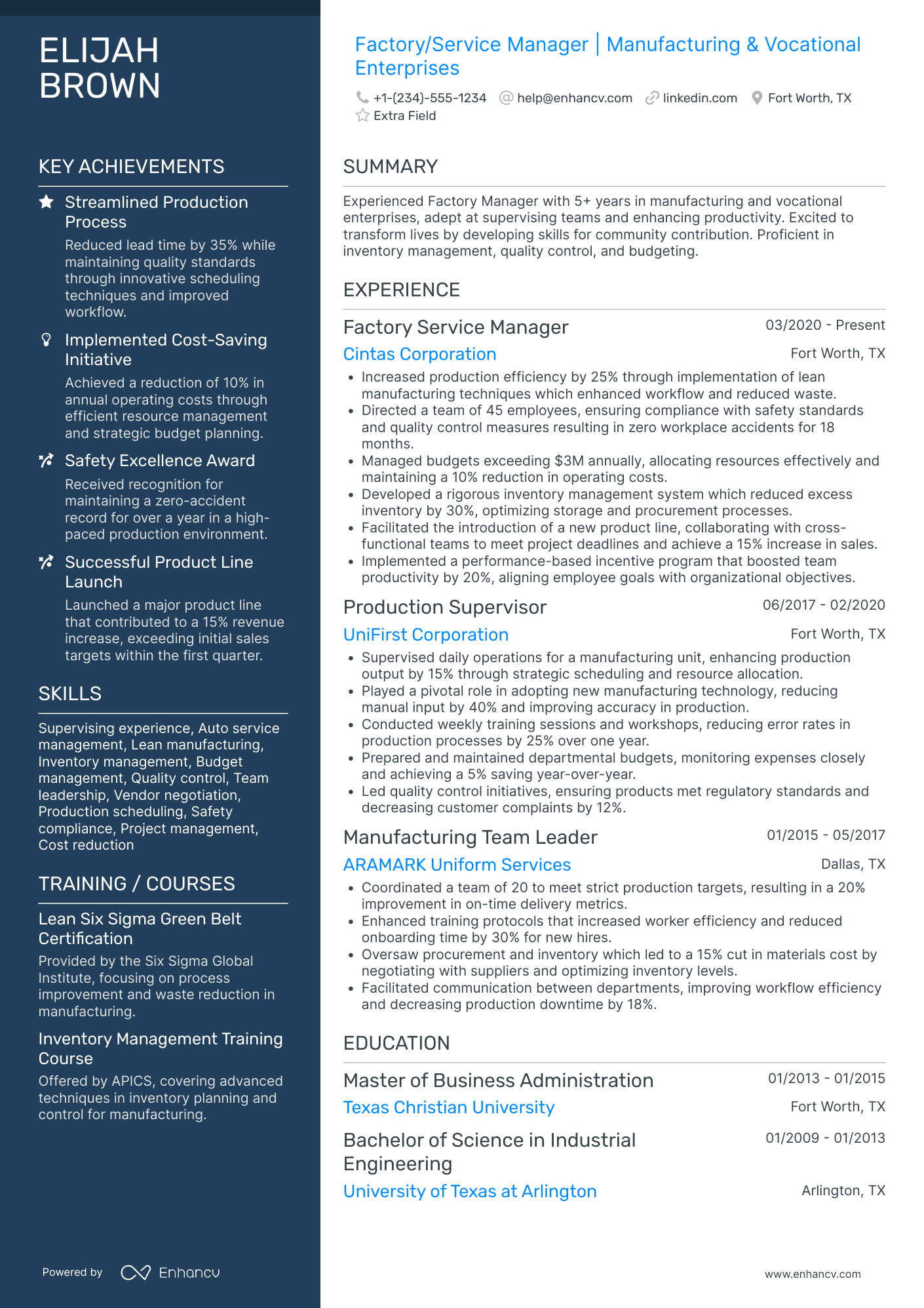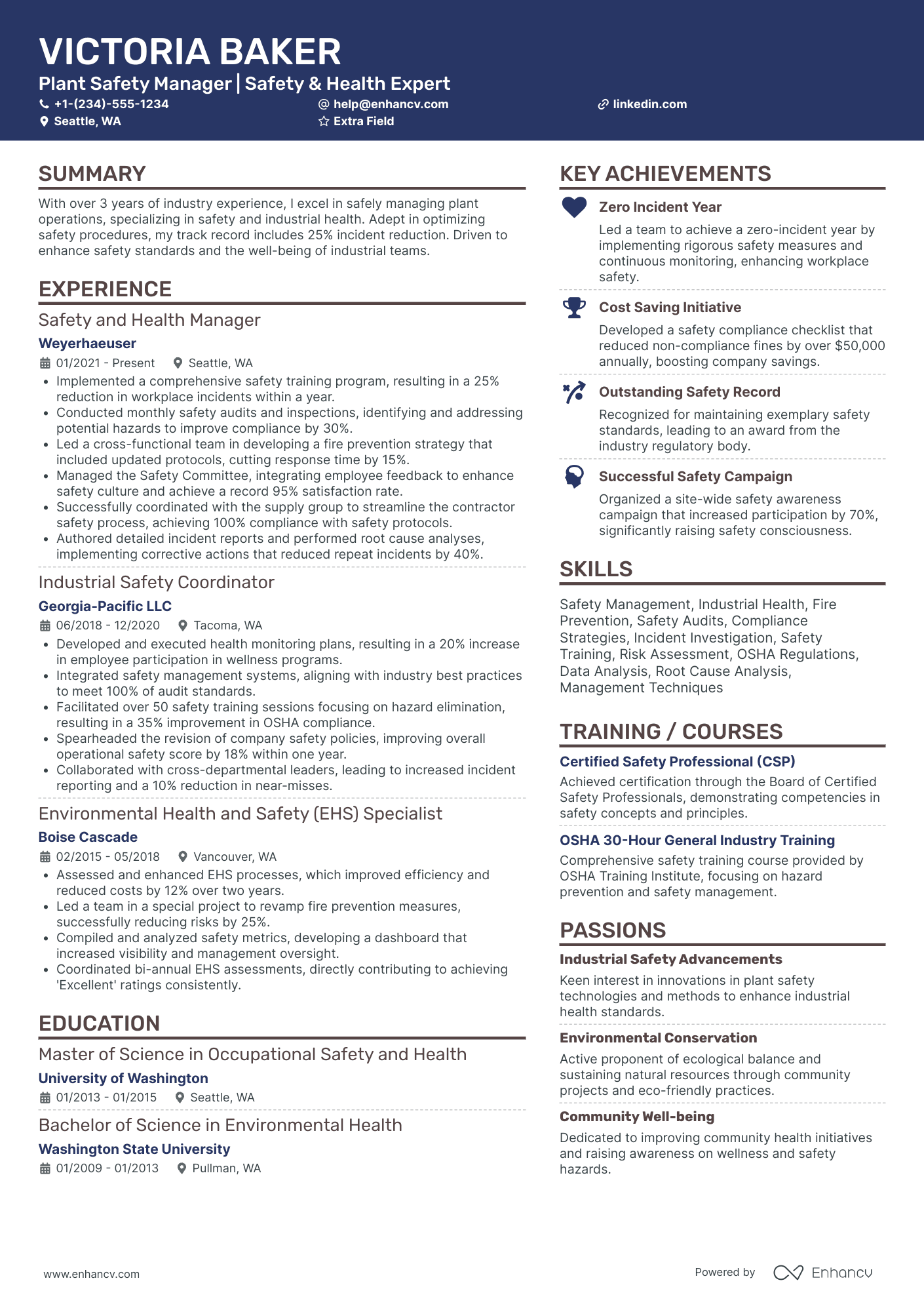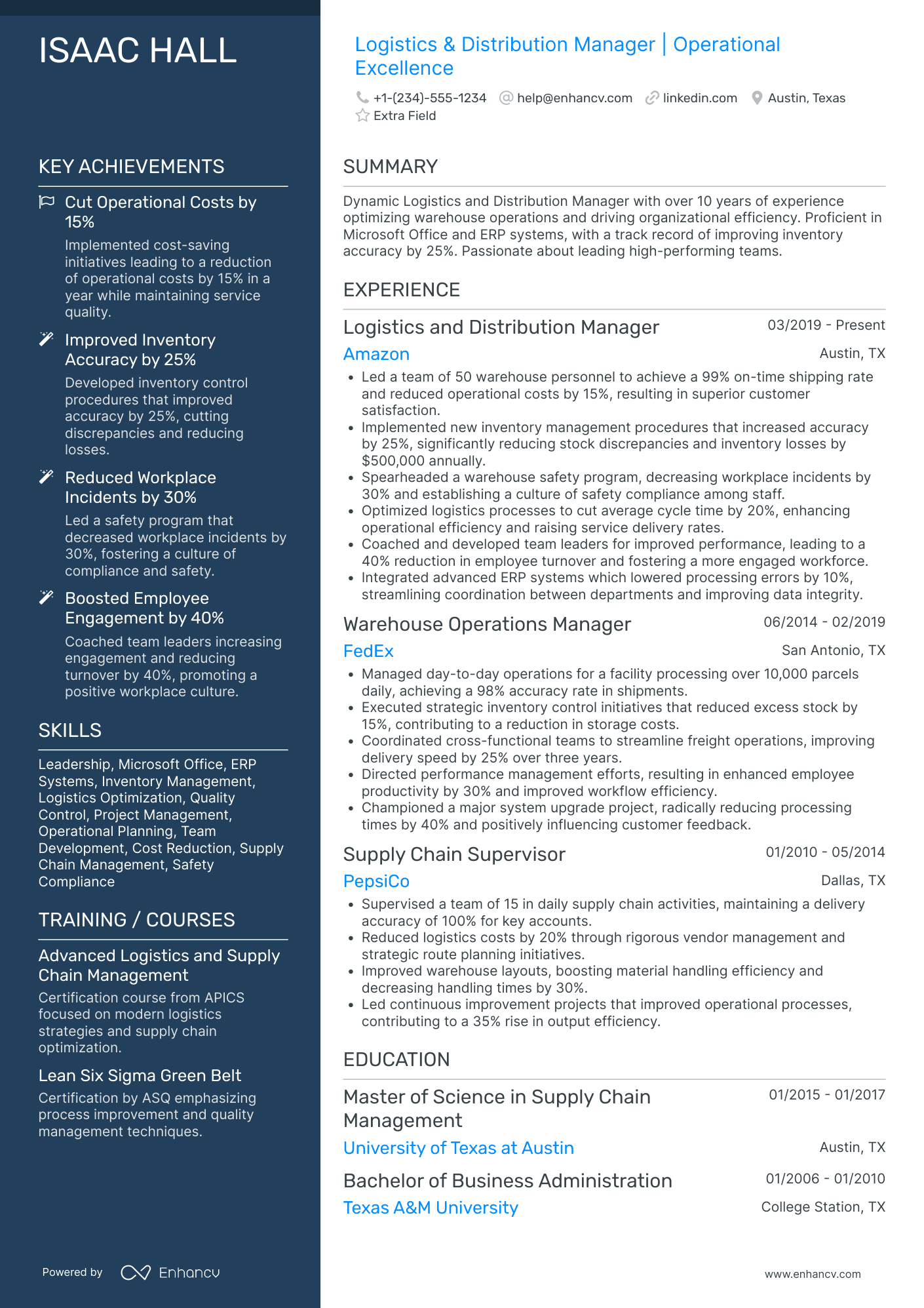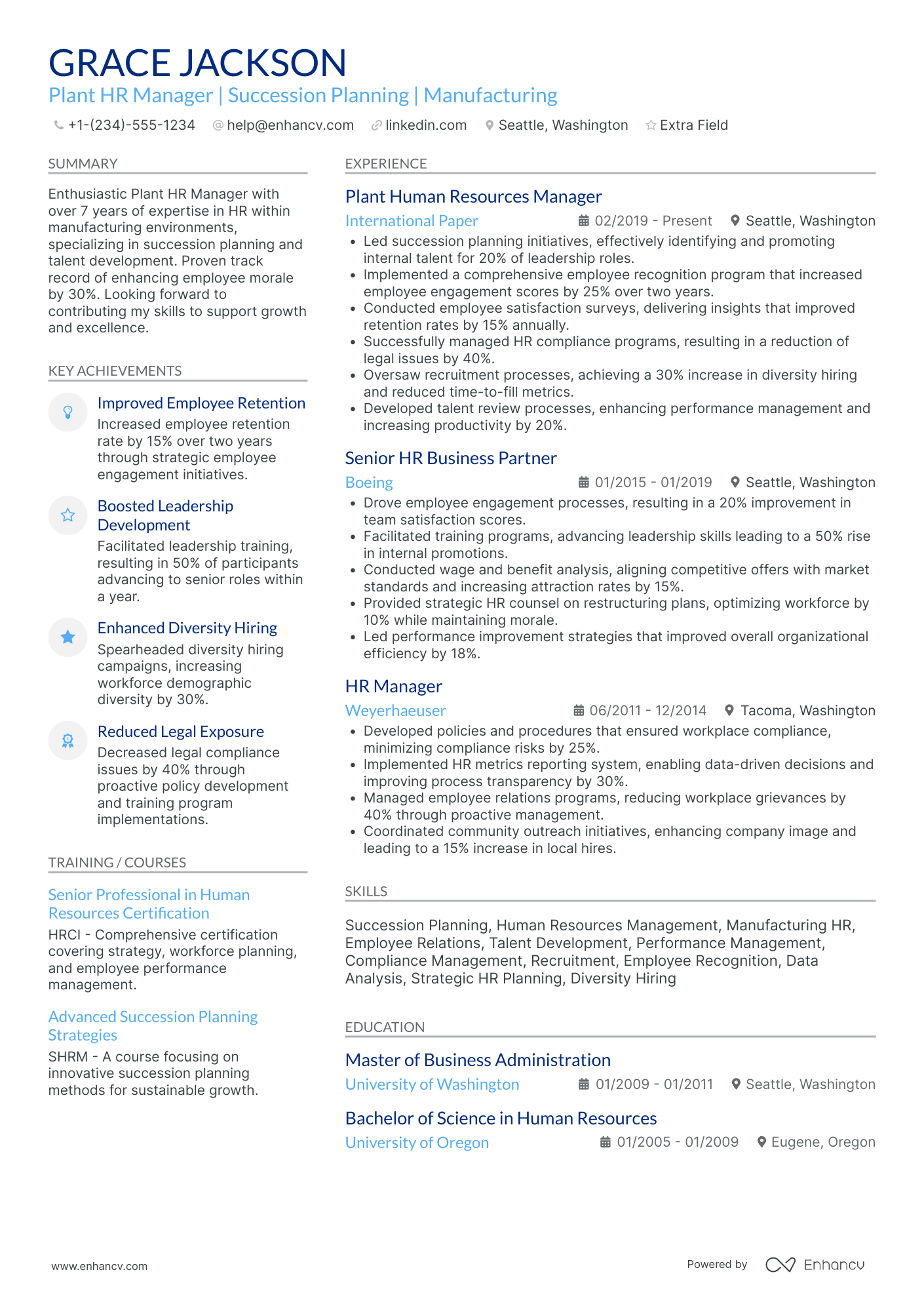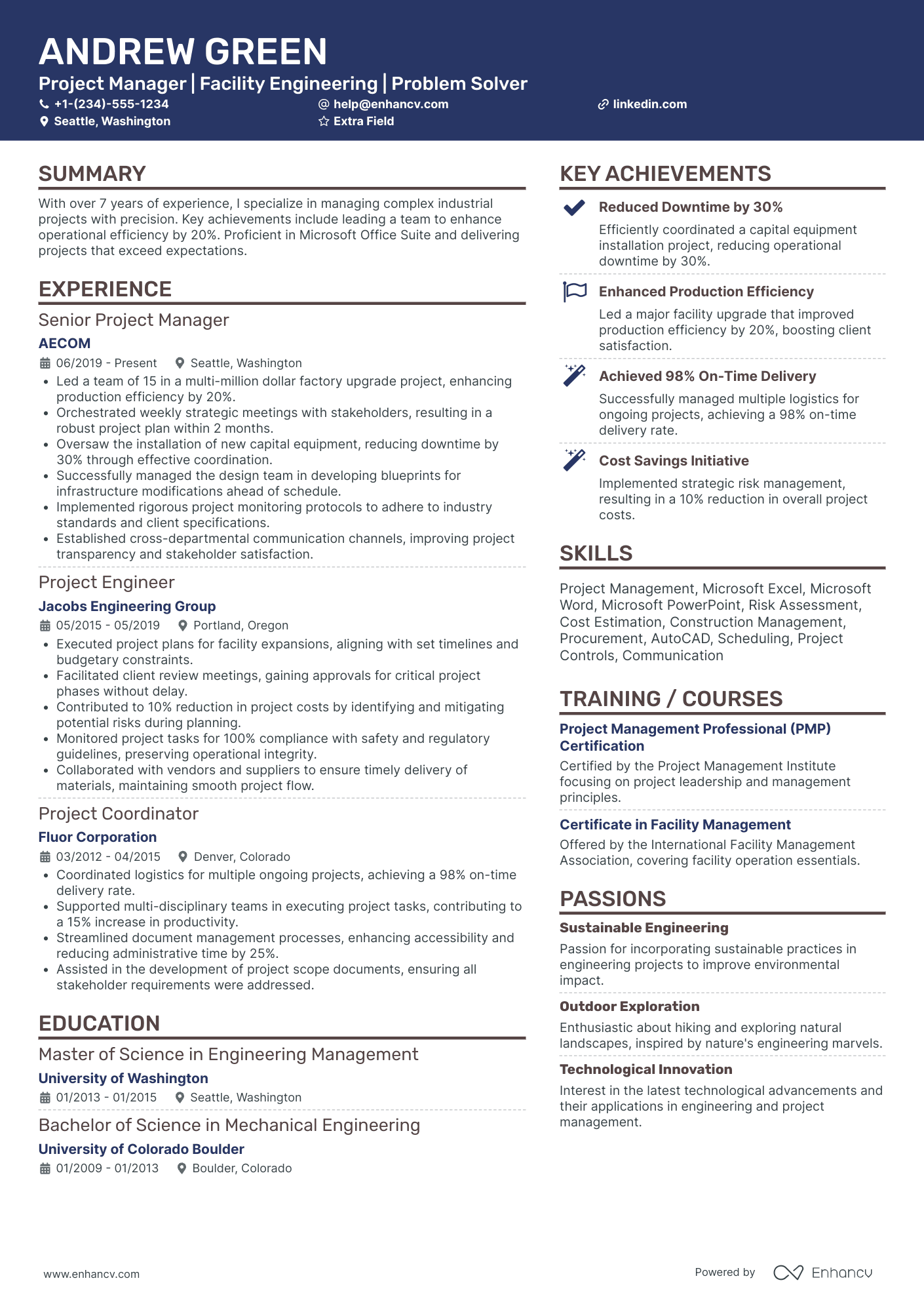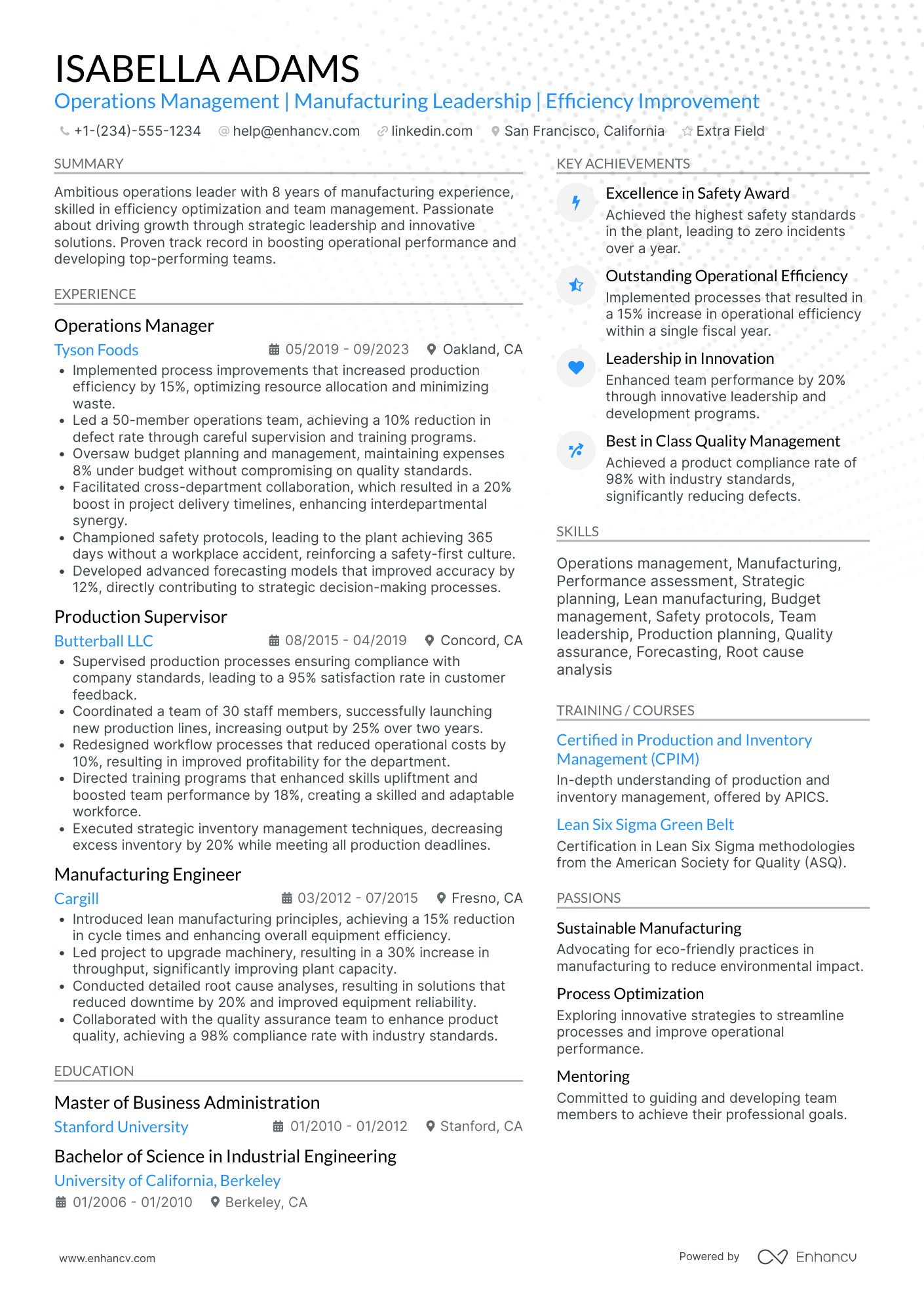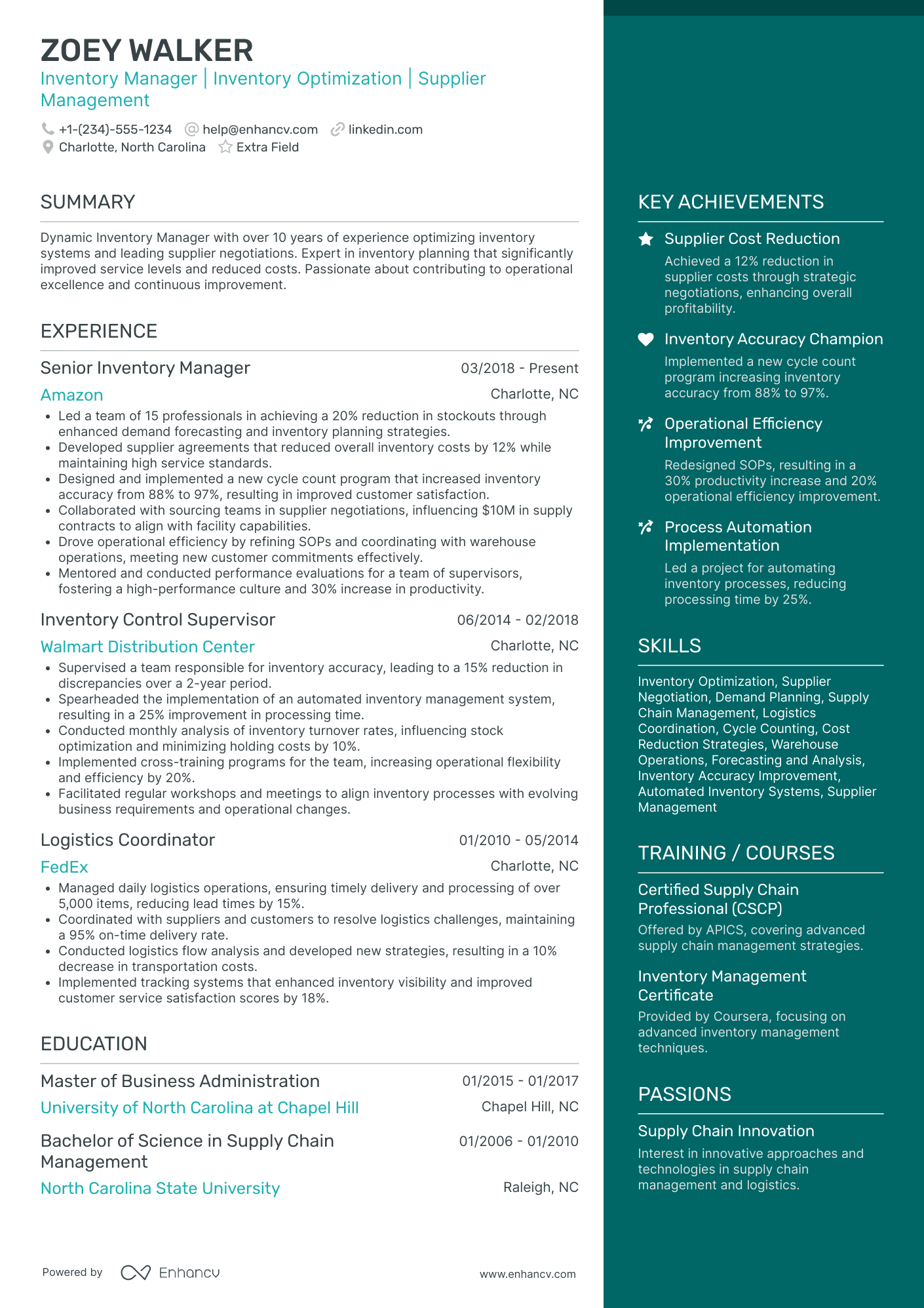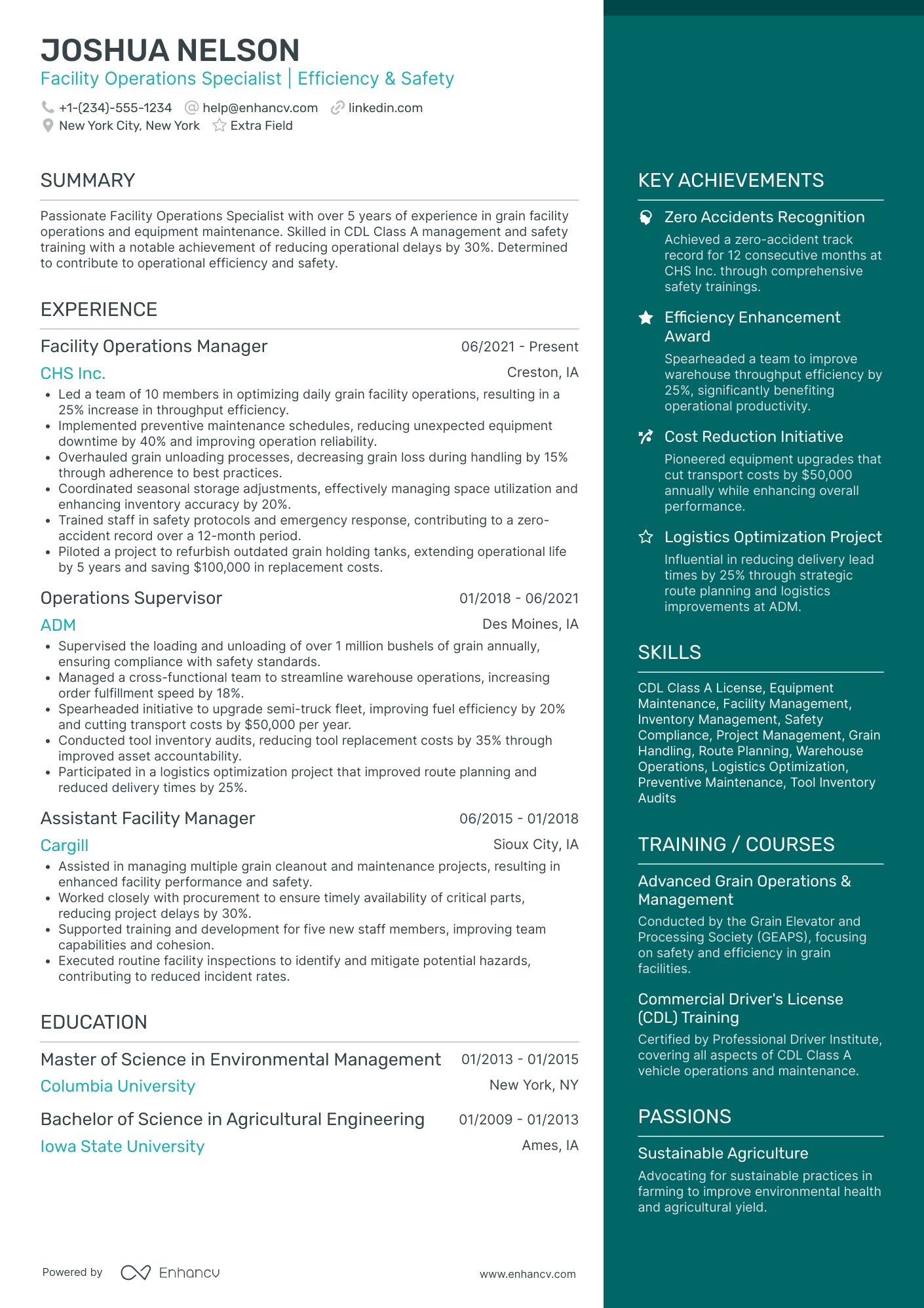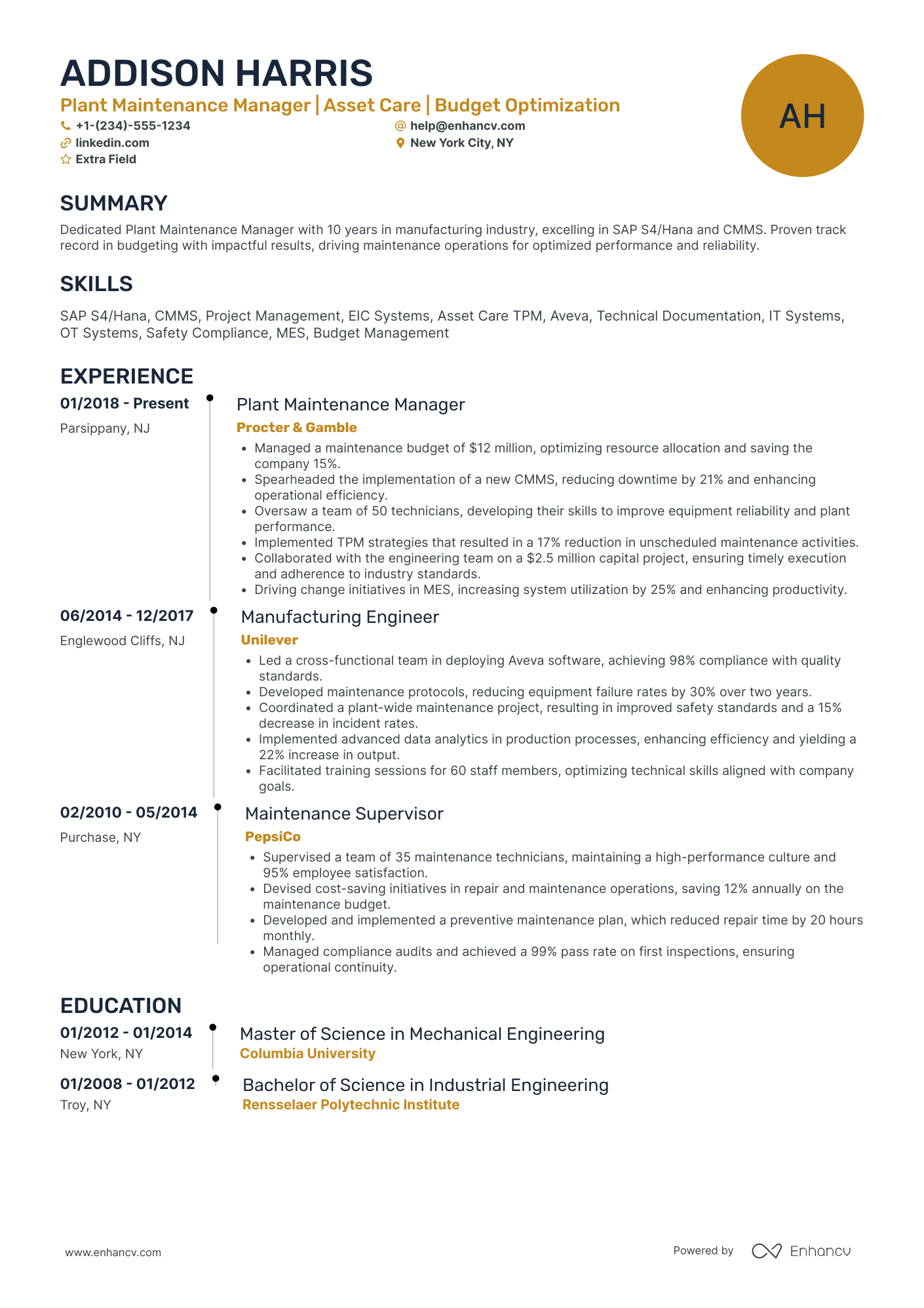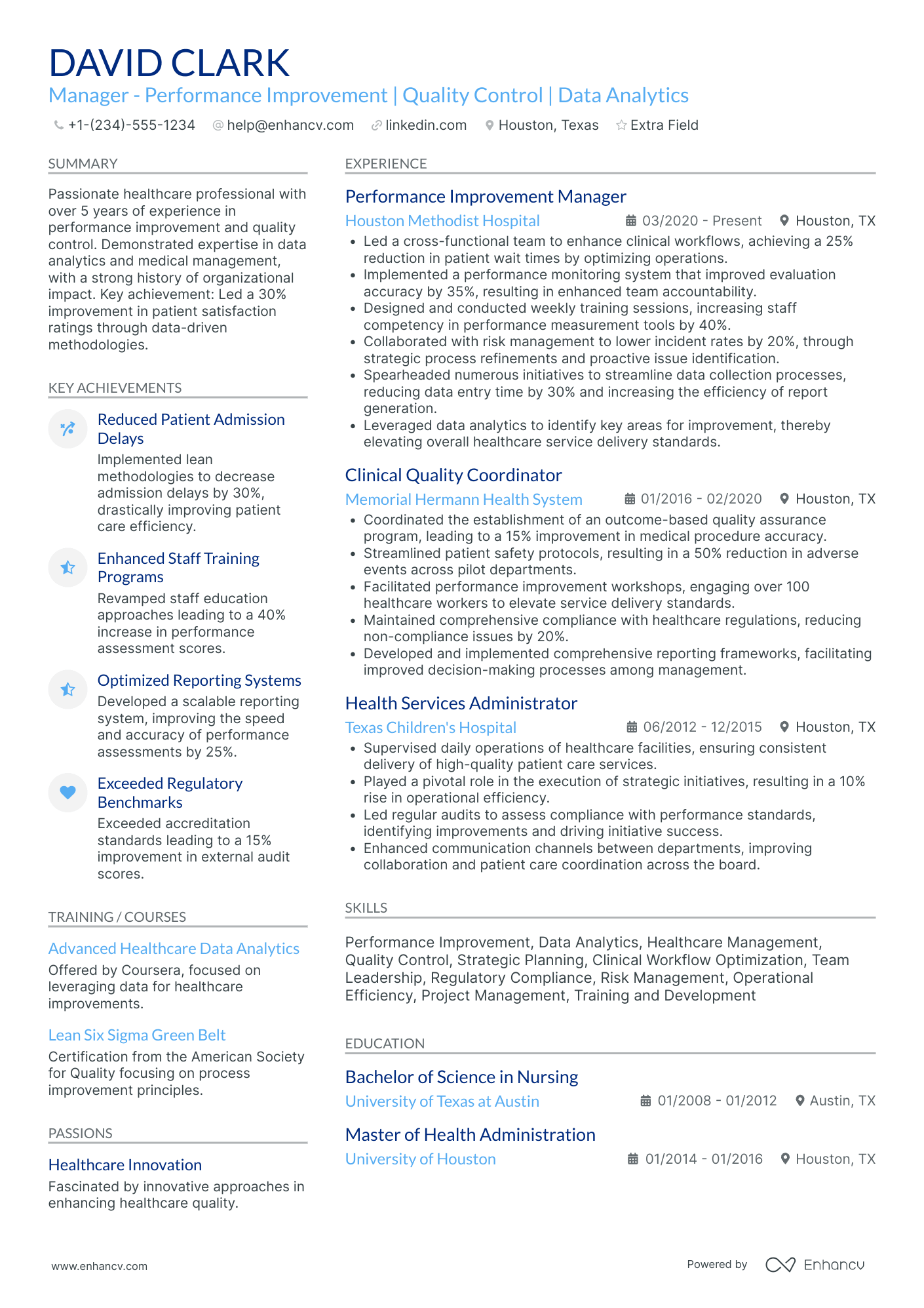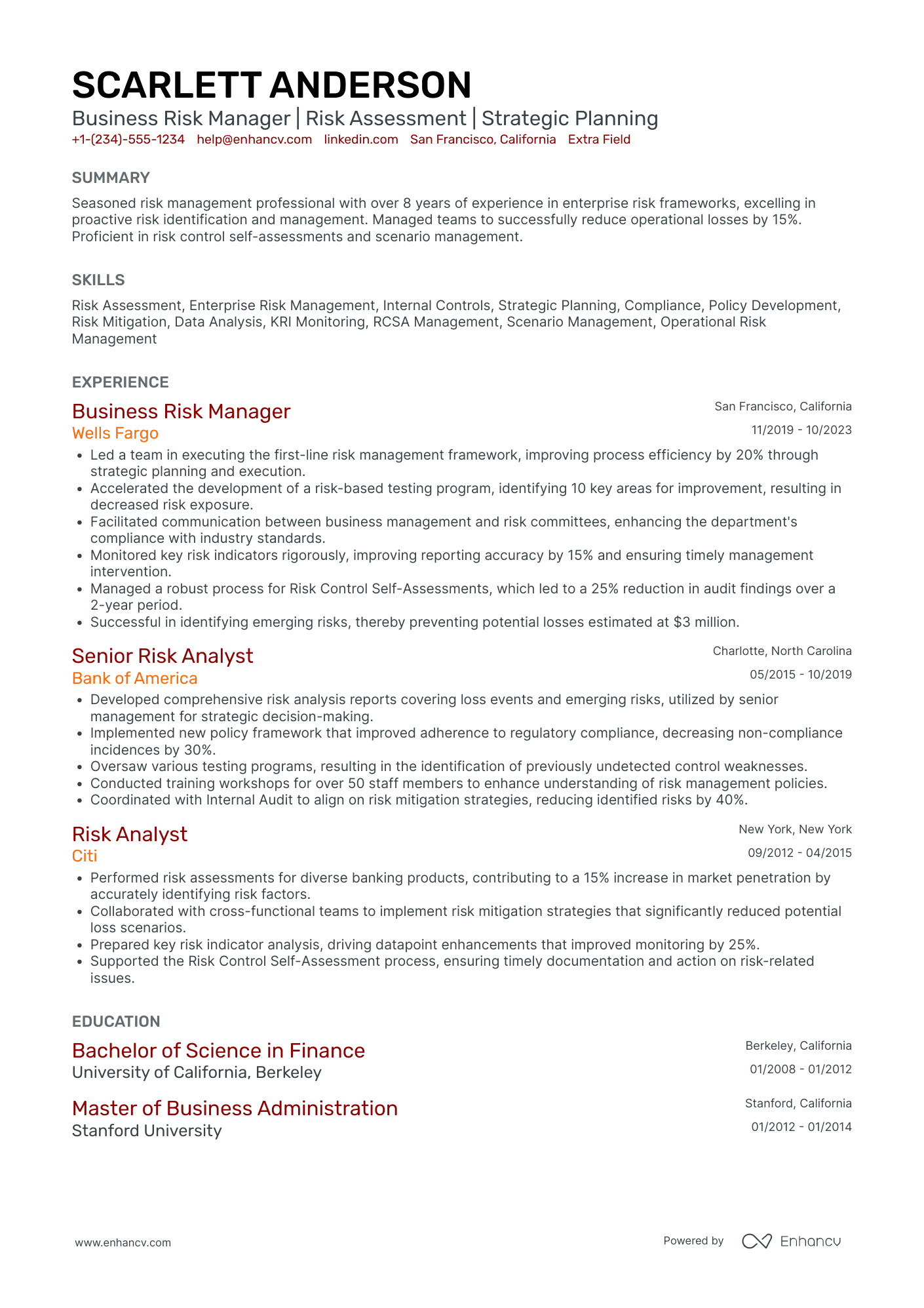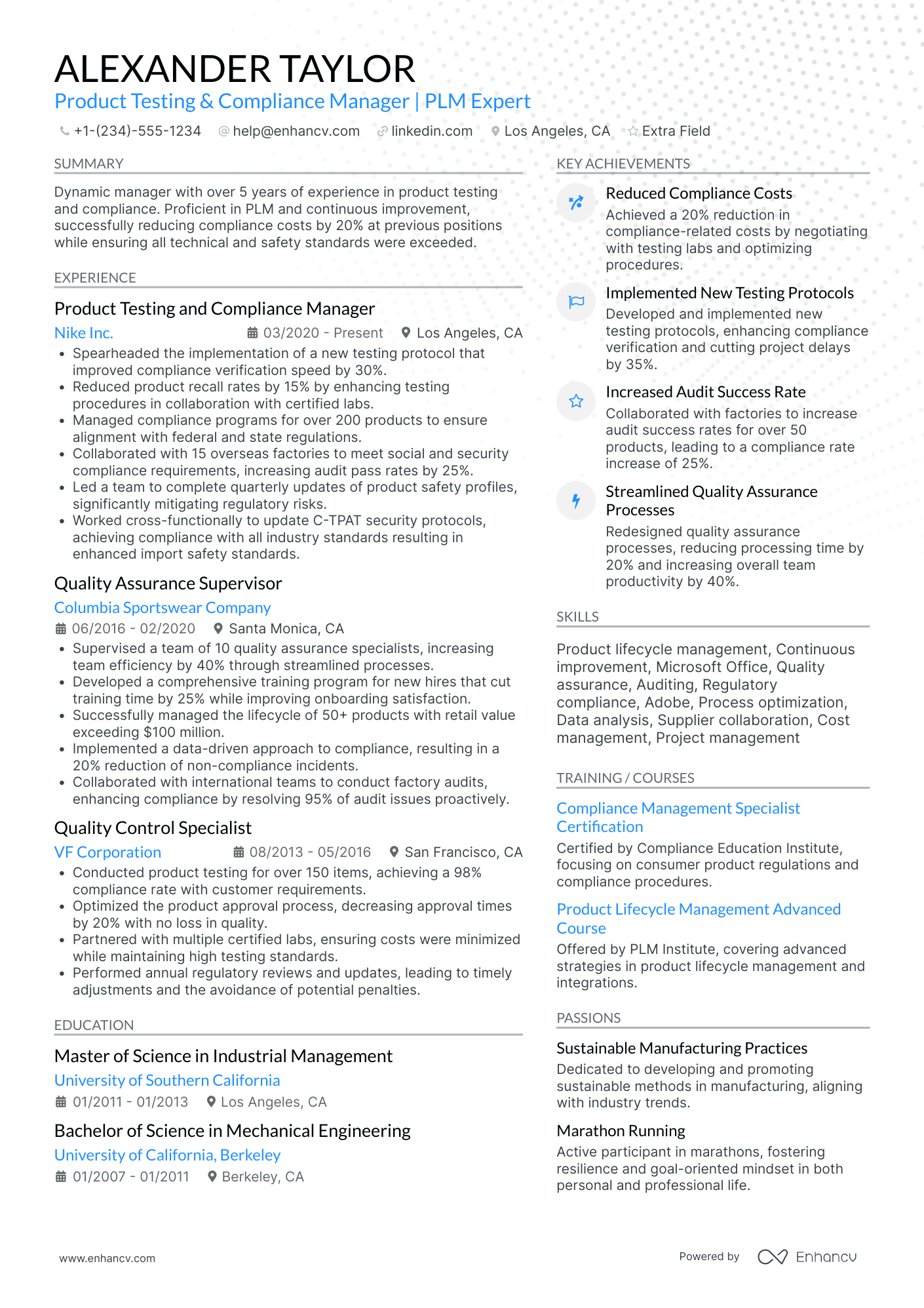As a factory manager, articulating the extent of your leadership skills and operational oversight to fit within the concise format of a resume can be a considerable challenge. Our guide provides targeted advice on how to effectively condense your extensive experience into compelling bullet points, ensuring that your resume strikes the perfect balance between detail and brevity.
- Defining the highlights of your factory manager career through your resume summary, objective, and experience.
- Real-world factory manager resume samples with best practices on how to stand out amongst the endless pile of candidate resumes.
- Most in-demand factory manager resume skills and certifications across the industry.
- Standardizing your resume layout, while maintaining your creativity and individuality.
If the factory manager resume isn't the right one for you, take a look at other related guides we have:
Designing your factory manager resume format to catch recruiters' eyes
Your factory manager resume will be assessed on a couple of criteria, one of which is the actual presentation.
Is your resume legible and organized? Does it follow a smooth flow?
Or have you presented recruiters with a chaotic document that includes everything you've ever done in your career?
Unless specified otherwise, there are four best practices to help maintain your resume format consistency.
- The top one third of your factory manager resume should definitely include a header, so that recruiters can easily contact you and scan your professional portfolio (or LinkedIn profile).
- Within the experience section, list your most recent (and relevant) role first, followed up with the rest of your career history in a reverse-chronological resume format .
- Always submit your resume as a PDF file to sustain its layout. There are some rare exceptions where companies may ask you to forward your resume in Word or another format.
- If you are applying for a more senior role and have over a decade of applicable work experience (that will impress recruiters), then your factory manager resume can be two pages long. Otherwise, your resume shouldn't be longer than a single page.
Consider the local standards – Canadian resumes, for example, may have a different format.
Upload & Check Your Resume
Drop your resume here or choose a file. PDF & DOCX only. Max 2MB file size.
PRO TIP
If you happen to have some basic certificates, don't invest too much of your factory manager resume real estate in them. Instead, list them within the skills section or as part of your relevant experience. This way you'd ensure you meet all job requirements while dedicating your certificates to only the most in-demand certification across the industry.
The key to your factory manager job-winning resume - present your expertise with these sections:
- A header to make your resume more scannable
- Snapshot of who you are as a professional with your resume soft skills, achievements, and summary or objective
- Job advert keywords in the skills section of your resume
- Resume experience quantifying your past job successes with metrics
- A relevant education, certification, and technical sills section to provide background to your technological/software capabilities
What recruiters want to see on your resume:
- Experience with production planning and understanding of manufacturing workflows.
- Demonstrated ability to improve production efficiency and reduce costs while maintaining product quality.
- Strong leadership skills with experience in managing and developing teams in a factory setting.
- Knowledge of safety standards and experience in implementing health and safety protocols.
- Proficiency in using manufacturing software and relevant technology to streamline operations.
The factory manager resume experience section: a roadmap to your expertise
The resume experience section provides you with an opportunity to tell your professional narrative.
Recruiters, reading between the lines of your resume, use the experience section to better understand your unique skill set, accomplishments, and what unique value you bring about.
Discover five quick steps on how to write your experience section:
- Curate only relevant experience items to the role and include the company, description, and dates; all followed by up to six bullets per experience item;
- Each experience item should feature tangible results of your actions - if you can include a number or percent, this will further highlight your aptitude;
- If you've received any managerial or customer feedback, use short excerpts of it as further social proof of your technical or people skills;
- Make sure you're using the appropriate verb tense when listing your responsibilities;
- Within the description for each role, you could summarize your most noteworthy and relevant achievements.
Now, take note of how a real-world factory manager professional received opportunities at industry leaders with these resume experience sections:
- Increased production efficiency by 25% through the implementation of a Lean manufacturing system in collaboration with the engineering team.
- Successfully managed a $30 million facility with over 200 employees, achieving the highest safety record for three consecutive years.
- Led a cross-functional team to develop and launch a new product line, which accounted for 15% of total revenue within the first year of release.
- Oversaw the transition to a fully automated packing system, reducing labor costs by 18% while increasing output by 35%.
- Championed the adoption of energy-efficient practices that cut down utility costs by nearly $200,000 annually.
- Nurtured vendor relations, securing more favorable raw material pricing and improving profit margins by 10%.
- Streamlined operations by introducing an ERP system that reduced order processing time by 40% and increased customer satisfaction.
- Developed a talent acquisition strategy that brought in skilled labor, resulting in a 20% productivity increase.
- Managed a capital budget of $15 million for facility upgrades, delivering all projects on time and under budget.
- Directed a workforce retraining program incorporating newest production technologies, enhancing employee skill levels and reducing turnover by 30%.
- Conducted market analysis to pivot production lines toward high-demand products, boosting sales by 22%.
- Implemented a rigorous quality assurance process, increasing product quality rates from 92% to 98%.
- Spearheaded the setup and commissioning of a new $25 million production line which increased capacity by 50%.
- Enhanced employee development programs, resulting in a 40% reduction in safety incidents and a 15% increase in staff retention.
- Negotiated with suppliers to optimize supply chain efficiency, realizing a 12% reduction in material costs.
- Pioneered the use of predictive maintenance techniques that decreased downtime by 39% and extended equipment lifespan.
- Orchestrated the facility's first export project to international markets, enhancing the brand's global presence.
- Led a continuous improvement initiative that realized $500,000 in annual savings through process optimization.
- Launched a workforce efficiency program that saw a 33% improvement in key performance indicators for production cycles.
- Facilitated company-wide adoption of Six Sigma methodologies, resulting in a 45% reduction of non-conformance costs.
- Initiated and supervised the expansion of the factory's clean room facilities, meeting the stringent requirements for new aerospace components production.
- Established a just-in-time inventory system that cut warehouse storage needs by 50%, significantly reducing capital tied up in stock.
- Coordinated with R&D to integrate cutting-edge technology into existing production lines, yielding a 20% increase in efficiency.
- Drove corporate sustainability efforts by aligning factory operations with environmental standards, achieving ISO 14001 certification.
The following content includes information from "O*NET OnLine" by the U.S. Department of Labor, Employment and Training Administration (USDOL/ETA). Used under the CC BY 4.0 license. The data represents the top responsibilities present on the task lists for factory manager professionals.
Top Responsibilities for Factory Manager:
- Set and monitor product standards, examining samples of raw products or directing testing during processing, to ensure finished products are of prescribed quality.
- Direct or coordinate production, processing, distribution, or marketing activities of industrial organizations.
- Review processing schedules or production orders to make decisions concerning inventory requirements, staffing requirements, work procedures, or duty assignments, considering budgetary limitations and time constraints.
- Review operations and confer with technical or administrative staff to resolve production or processing problems.
- Hire, train, evaluate, or discharge staff or resolve personnel grievances.
- Develop or implement production tracking or quality control systems, analyzing production, quality control, maintenance, or other operational reports to detect production problems.
- Prepare and maintain production reports or personnel records.
- Review plans and confer with research or support staff to develop new products or processes.
- Develop budgets or approve expenditures for supplies, materials, or human resources, ensuring that materials, labor, or equipment are used efficiently to meet production targets.
- Maintain current knowledge of the quality control field, relying on current literature pertaining to materials use, technological advances, or statistical studies.
Quantifying impact on your resume
- Include the size of the team you managed, as it demonstrates leadership scale and organizational complexity.
- List the percentage by which you reduced operational costs, showcasing your ability to drive efficiency and save money.
- Specify the dollar value of projects you have overseen, illustrating your experience with significant budget management.
- Mention the numerical improvement in production output under your leadership, highlighting your operational effectiveness.
- Detail the percentage increase in product quality or decrease in defect rates, indicating your focus on quality control.
- Quantify inventory accuracy improvements in percentage terms to show your capability in inventory management.
- State the exact number of process improvements implemented, reflecting your continuous improvement efforts.
- Note the reduction in staff turnover rate you accomplished, evidencing your skills in employee retention and morale boosting.
Action verbs for your factory manager resume
No experience, no problem: writing your factory manager resume
You're quite set on the factory manager role of your dreams and think your application may add further value to your potential employers. Yet, you have no work experience . Here's how you can curate your resume to substitute your lack of experience:
- Don't list every single role you've had so far, but focus on ones that would align with the job you're applying for
- Include any valid experience in the field - whether it's at research or intern level
- Highlight the soft skills you'd bring about - those personality traits that have an added value to your application
- Focus on your education and certifications, if they make sense for the role.
Recommended reads:
PRO TIP
Showcase any ongoing or recent educational efforts to stay updated in your field.
Defining your unique factory manager skill set with hard skills and soft skills
In any job advertisement, a blend of specific technologies and interpersonal communication skills is typically sought after. Hard skills represent your technical expertise and indicate your job performance capacity. Soft skills, on the other hand, demonstrate how well you would integrate within the company culture.
Incorporating a balanced mix of both skill types in your factory manager resume is crucial. Here's how you can do it:
- In your resume summary or objective, incorporate up to three hard and/or soft skills. Make sure to quantify these skills with relevant or impressive achievements; less
- The skills section should list your technical know-how.
- The strengths section is an ideal place to quantify your competencies by focusing on the achievements facilitated by these skills.
Top skills for your factory manager resume:
Lean Manufacturing
Six Sigma
Production Planning Software
Quality Control Systems
Supply Chain Management Tools
CAD Software
ERP Systems
Inventory Management Software
Machine Maintenance Technologies
Safety Compliance Tools
Leadership
Communication
Problem-Solving
Time Management
Team Building
Decision Making
Adaptability
Conflict Resolution
Analytical Thinking
Emotional Intelligence
Next, you will find information on the top technologies for factory manager professonals from "O*NET OnLine" by the U.S. Department of Labor, Employment and Training Administration (USDOL/ETA). Used under the CC BY 4.0 license.
Top technologies for Factory Manager’s resume:
- Oracle PeopleSoft
- SAP software
- Adobe After Effects
- YouTube
- Schneider Electric CitectSCADA
- Supervisory control and data acquisition SCADA software
PRO TIP
The more time and effort you've put into obtaining the relevant certificate, the closer to the top it should be listed. This is especially important for more senior roles and if the company you're applying for is more forward-facing.
The importance of your certifications and education on your factory manager resume
Pay attention to the resume education section . It can offer clues about your skills and experiences that align with the job.
- List only tertiary education details, including the institution and dates.
- Mention your expected graduation date if you're currently studying.
- Exclude degrees unrelated to the job or field.
- Describe your education if it allows you to highlight your achievements further.
Your professional qualifications: certificates and education play a crucial role in your factory manager application. They showcase your dedication to gaining the best expertise and know-how in the field. Include any diplomas and certificates that are:
- Listed within the job requirements or could make your application stand out
- Niche to your industry and require plenty of effort to obtain
- Helping you prepare for professional growth with forward-facing know-how
- Relevant to the factory manager job - make sure to include the name of the certificate, institution you've obtained it at, and dates
Both your certificates and education section need to add further value to your application. That's why we've dedicated this next list just for you - check out some of the most popular factory manager certificates to include on your resume:
The top 5 certifications for your factory manager resume:
- Certified Production and Inventory Management (CPIM) - APICS
- Certification in Production and Inventory Management (CPIM) - Association for Supply Chain Management (ASCM)
- Certified Manager of Quality/Organizational Excellence (CMQ/OE) - American Society for Quality (ASQ)
- Certified Plant Engineer (CPE) - Association for Facilities Engineering (AFE)
- Project Management Professional (PMP) - Project Management Institute (PMI)
The content below includes information from "O*NET OnLine" by the U.S. Department of Labor, Employment and Training Administration (USDOL/ETA). Used under the CC BY 4.0 license. The data represents the top associations for factory manager professionals.
Top US associations for a Factory Manager professional
- American Foundry Society
- American Institute of Chemical Engineers
- American Management Association
- American Society for Quality
- ASM International
PRO TIP
Listing your relevant degrees or certificates on your factory manager resume is a win-win situation. Not only does it hint at your technical capabilities in the industry, but an array of soft skills, like perseverance, adaptability, and motivation.
Recommended reads:
Writing the factory manager resume summary or objective: achievements, keywords, dreams, and more
Deciding on whether to include a resume summary or resume objective should entirely depend on your career situation.
If you have:
- Plenty of relevant achievements you'd like to bring recruiters' focus to, make use of the resume summary. Ensure each of your achievements is quantified with concrete proof (e.g. % of cases solved).
- Less applicable experience, utilize the resume objective. Within the objective include a few noteworthy, past successes, followed up by your professional dreams.
As a bonus, you could define in either your factory manager resume summary or objective what makes you the perfect candidate for the role.
Think about your unique hard and soft skills that would make your expertise even more important to the job.
These factory manager professionals have completely covered the formula for the ideal resume introduction:
Resume summaries for a factory manager job
- Accomplished factory manager with over 12 years of experience overseeing production operations in the automotive industry for General Motors. Expert in lean manufacturing techniques that have resulted in a 20% efficiency increase. Proven track record in employee leadership, process optimization, and exceeding productivity targets.
- Dynamic professional transitioning from a successful 10-year career in the aerospace engineering sector to factory management. Brings a wealth of experience in systems optimization and project management, as well as a fresh perspective on process efficiency. Eager to apply an analytical skillset to improve production workflows and output.
- Veteran production supervisor with 15 years at Samsung leading multiple product lines. Integral in scaling up production by 35% through strategic workflow adjustments. Possesses a commanding knowledge of Six Sigma and continuous improvement methodologies, driving quality enhancement and cost reduction initiatives.
- Former hospitality executive making a strategic career pivot into factory management, leveraging exceptional team building and operational oversight abilities. Excited to transfer a decade of experience managing complex service operations to the manufacturing sector, aiming to streamline production processes and elevate team performance.
- Eager to embark on a career in factory management, leveraging a recent degree in industrial engineering and a passion for technology-driven manufacturing solutions. Adept at data analysis, keen to utilize the latest innovations in automation to improve production efficiency and throughput.
- Aspiring factory manager with a solid foundation in mechanical engineering, including internships at leading manufacturing plants. Motivated to apply academic knowledge and practical training to enhance process flows and contribute to the success of a production team. Committed to mastering industry-leading management practices.
Optimize your resume summary and objective for ATS
Drop your resume here or choose a file.
PDF & DOCX only. Max 2MB file size.
Average salary info by state in the US for factory manager professionals
Local salary info for Factory Manager.” Source: My Next Move, National Center for O*NET Development. Accessed 10/15/2024
| State | Average Salary (in USD) |
|---|---|
| US National Average | $116,970 |
| California (CA) | $128,890 |
| Texas (TX) | $124,380 |
| Florida (FL) | $111,000 |
| New York (NY) | $127,800 |
| Pennsylvania (PA) | $104,380 |
| Illinois (IL) | $119,190 |
| Ohio (OH) | $99,970 |
| Georgia (GA) | $121,240 |
| North Carolina (NC) | $112,960 |
| Michigan (MI) | $108,810 |
Other factory manager resume sections to support your expertise and skills
Recruiters are always on the lookout for that factory manager candidate who brings about even more value to the role.
This can be either via their personality or additional accreditations they have across the industry.
Add to your resume any of the four sections that fit your profile:
- Projects for your most impressive, cutting-edge work;
- Awards or recognitions that matter the most;
- Publications further building up your professional portfolio and accreditations;
- Hobbies and interests to feature the literature you read, how you spend your time outside of work, and other personality traits you deem may help you stand out .
Key takeaways
At the end of our guide, we'd like to remind you to:
- Invest in a simple, modern resume design that is ATS friendly and keeps your experience organized and legible;
- Avoid just listing your responsibilities in your experience section, but rather focus on quantifiable achievements;
- Always select resume sections that are relevant to the role and can answer job requirements. Sometimes your volunteering experience could bring more value than irrelevant work experience;
- Balance your technical background with your personality traits across various sections of your resume to hint at how much time employers would have to invest in training you and if your profile would be a good cultural fit to the organization;
- Include your academic background (in the form of your relevant higher education degrees and certifications) to show recruiters that you have the technical basics of the industry covered.
Factory Manager resume examples
By Experience
By Role
